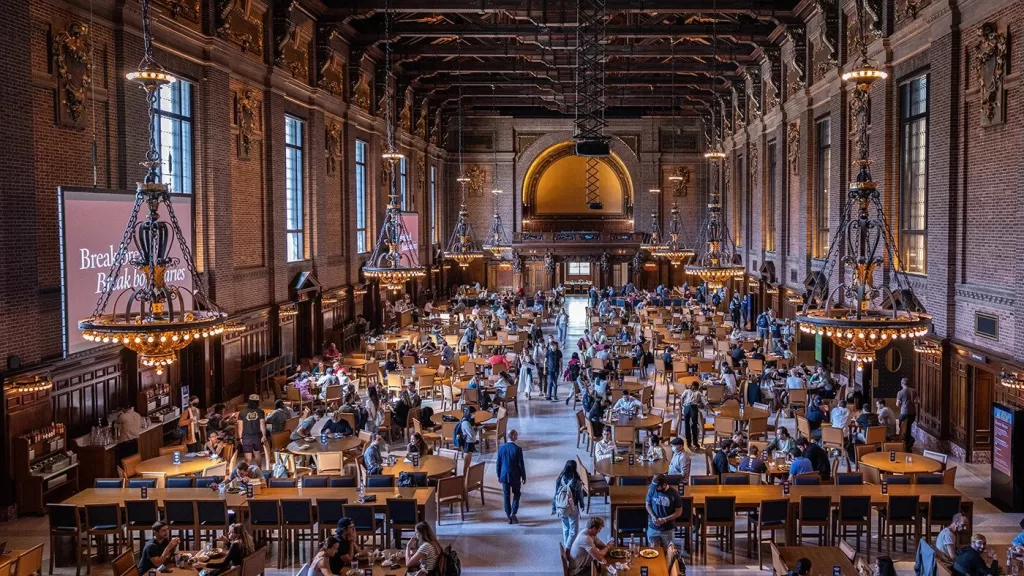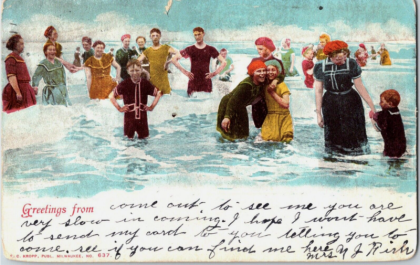
Photo taken from yale.edu
It could happen any time, any place on the Yale campus. A plate of food unexpectedly clatters down next to you in the dining hall, or a computer is abruptly whipped out next to you in the library. A light, vaguely floral scent washes over you. She smiles at you, and without waiting for a smile in return asks, “What’s your name?”
You have just met Karinne Tennenbaum, Yale’s serial people-meeter. Before long, you will receive emails, texts, rumors about outlandish and fantastical events. Group chats will populate your inboxes, tantalizing you with weekend picnics and pickleball soirees. Life is whisking you up by the scruff of the neck and twirling you around—you, who had been an inveterate Friday night studier, who said weekends were for homework! Yet this is no Hollywood deception.
This is the machination of one person—and all you need to do is hit “Yes” on the Google Calendar invite.
Karinne was one of my first friends at Yale, purely because she was bold enough to introduce herself. It was a cold-text through Instagram, during the last of those endless high-school summers, before Yale was even on my mind. I responded to the peppy message, and we got into a conversation over text that rambled past such niceties as major and hometown.
Every month after that, she sent me a music recommendation captioned “Latest bop for you.”
Throughout the year, I have slowly discovered that I am one of many. Everyone’s story is the same: “A random girl started talking to me.” And they’re better off for it. They all seem to have the relationship that I have with Karinne; most of them label her as a close friend.
I did a quick calculation of Karinne’s daily activities: spending time with all those friends, responding to her teeming emails and texts, and attending her many extracurriculars—far over 24 hours. Partly from a scientific curiosity and partly for selfish reasons, I wanted to know the secret to how she met all these people and kept them in her life. So I sat her down in Yale’s cavernous dining hall, Commons, to find out.
Sitting across from me with bolognese in hand, she laughed.
“There is no secret.”
Karinne had just bolted over from her lab work, and lunch, as with everything else in her life, was squeezed tightly into her schedule.
Instead of in the dining hall, per her recommendation we perched on a balcony high above the crowds of Yale students jostling for table seats. (Karinne likes to dispense free advice: a parenthetical “highly recommend” often follows up any resource that she mentions, tour-guide-like.) Bringing me to the edge of the balcony, she gestured to the people below. Some tables were surrounded by humanities students in spirited conversation, some by STEM kids hunched over their computers. At others a student ate their food alone, only lacking a companion to confide in.
“Like in science, you choose a project that you believe will have a good outcome,” she said. Chances are you were unknowingly surveyed long before you had that first encounter with Karinne.
Karinne’s insight: the topic of conversation does not depend on the context of the place.
“The conversation is the same, whether it happens in the laundry room, the street, the dining hall.” She has thoroughly dissected the opening volley of introductory remarks, and even describes a step-by-step template to me.
“The first step is to say ‘hi,’ and then I’ll ask one of two questions: ‘What’s new?’ or ‘How are you feeling today?’ If it’s someone I don’t know, I’ll ask ‘How is your (day of the week) going?” That way, she explains, they start off on a personal note rather than the precooked facts.
Recently, she has been incorporating “Tell me about your family,” as the third question. “I was discussing cultural differences with a Greek friend, and in Greece, there is more emphasis on family in conversations. And you’ll find that people in the U.S. do want to talk about it—they just don’t get asked because it’s a meaningful topic.”
She was using the same level of analysis to talk about chit-chat as a chess grandmaster examining a game. Calling Karinne’s template ‘small talk’ was an injustice.
The serial nature of Karinne’s socialization can be traced back to her upbringing. She grew up in a family of scientists, with both parents doing esoteric research in labs. Conversation in the Tennenbaum household revolved around the parents’ work.
“My parents didn’t leave work in the lab,” Karinne said—it made it as far as the dinner table.
“How my mom’s day was going depended on how the experiment was going.”
Unscientific notions were stamped out of her at a young age: “We were on a plane, and I wanted to fly as a kid. I asked my mom, am I ever going to fly? ‘Nope.’” So instead, Karinne studied the science of flying. And following that old maxim adopted by her family, “Put 100% into everything you do,” ornithology consumed her free time.
Part of the Environmental Youth Council, founder of the Bird Club, co-president of her Audubon Bird Society chapter, research on an obscure South American hummingbird… Karinne could have gone on.
During her high-school years, she also found time to found a book club, play clarinet in her symphony band, and be part of an ‘Alumni Committee Student Council.’ On top of that, she had schoolwork.
“I was bored in class, and I often asked the teacher, ‘Can we do homework on this?’ much to the chagrin of the other students,” she said.
But when she took a bird’s-eye view of her life in senior year, Karinne brushed up against an existential crisis, realizing she had never bothered to meet many of her peers or even learn their names. In grand style, the solution: learn everyone’s name in the concert band. Employing the methods of science, she sat next to someone different in the band every time, asking those questions we have come to know so well. Learning so many people’s names had an unexpected long-lasting effect.
“I remember oh… ninety-five percent of people’s names that I meet,” she confided. She called this project the ‘name game.’ To her it was an experiment, conducted with the same systematicity as her dissections of hummingbird skeletons—except the subject was herself. What she did at her previous school, Karinne amped up to an industrial scale at Yale.
Some people know her as the girl who, daily, invites the whole dorm group chat to study alongside her (“silence rule enforced”). Others know her as the girl who made a 500-person group chat out of a general chemistry lecture. Still others know her as the girl who camped out in the laundry room with a chair and speaker for three hours, greeting every launderer with a “How’s your day going?”
A friend of mine said, “She martyred herself in bio lecture by proving a question wrong on the bio exam—cross-checking everyone else’s answers for evidence—which made her lots of friends.”
I recently went to a hot chocolate party hosted by Karinne. Raucous partiers on their fourth mug of chocolate—or hot toddy— converged around the center of her suite’s common room. Off to the side, Karinne huddled over a cauldron of cocoa, submerged by a long list of hot chocolate orders. I offered to stir but she demurred, insisting that I meet this and that interesting person. Torn between the swirling mob and Karinne’s lonely figure, I found myself in a moral dilemma.
But Karinne, frantically dishing out hot chocolate to keep the party fueled, had envisioned exactly this party. Karinne’s ultimate goal is not to learn as many names as possible, but to build something out of them. Like a puppeteer, she pulls strings from afar, maneuvering all the characters to one place; like a chemist, she mixes personalities to concoct a utopian community.
Once her job is done, she recedes into the background, watching her creation take flight. In her words: “It makes the campus feel smaller.”
By Miles Zaud












